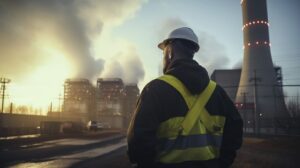Are you considering a career as an IC&E Technician? If so, you’re in the right place! As the power industry evolves, IC&E Technicians’ jobs play an increasingly crucial role in maintaining and optimizing systems that power everything from homes to businesses. With opportunities in various sectors, including the growing field of hydroelectric power, the role of an IC&E Technician offers both stability and career growth. But what exactly does an IC&E Technician do, and what career path lies ahead for someone in this field? Let’s dive in.
Understanding the Role of an IC&E Technician

IC&E stands for Instrumentation, Controls, and Electrical. An IC&E Technician is responsible for ensuring that the equipment and systems used in industries, especially those in power generation, function properly and efficiently. These technicians install, maintain, and repair the intricate systems that control machinery, monitor energy production, and ensure the safety of operations.
Typically, IC&E Technicians work with electrical systems, instrumentation devices, and control systems. Their expertise is essential in industries like power generation, water treatment, manufacturing, and petrochemicals. In particular, hydropower plants rely heavily on these technicians to maintain the instruments that monitor water flow, turbine performance, and electrical output.
Key Responsibilities of an IC&E Technician
The role of an IC&E Technician is both varied and complex, requiring a strong technical skill set. Here are some of the key responsibilities:
- Installation and Calibration: IC&E Technicians are responsible for installing and calibrating instruments that monitor and control the systems. This could involve setting up sensors, controllers, and electrical devices that ensure smooth operations in power plants, including hydroelectric power plants.
- Maintenance and Troubleshooting: One of the primary tasks of an IC&E Technician is regular maintenance and troubleshooting. They must identify issues with control systems, electrical circuits, or instrumentation devices and resolve them efficiently to avoid any disruption in the power generation process.
- System Monitoring: They monitor systems in real-time, ensuring everything is running within safe parameters. For example, in a hydroelectric power plant, an IC&E Technician might be responsible for overseeing the turbines, generators, and control systems that regulate water flow and electrical output.
- Repair and Upgrades: IC&E Technicians are called upon to repair or replace faulty parts. They also help upgrade systems as new technology emerges, ensuring that the equipment is up to date with the latest industry standards.
- Safety Compliance: Ensuring safety is a major part of an IC&E Technician’s role. They work to maintain compliance with safety regulations and standards to prevent accidents or malfunctions. This responsibility is especially important in high-risk environments like power plants, where safety directly affects both personnel and equipment.
- Documentation and Reporting: IC&E Technicians also maintain detailed records of their work. These records help to track equipment performance, predict necessary repairs, and report any issues that may arise.
Skills Required to Be an IC&E Technician
To succeed as an IC&E Technician, you’ll need a specific set of skills, both technical and soft. Here are some essential skills:
- Technical Knowledge: A strong understanding of electrical systems, instrumentation, and control systems is essential. You’ll need to understand how to read schematics, use diagnostic tools, and troubleshoot complex issues.
- Attention to Detail: As an IC&E Technician, you must be detail-oriented, ensuring that everything from sensors to control panels is calibrated and functioning accurately.
- Problem-Solving Abilities: You will face challenges regularly. Whether it’s a malfunctioning sensor or a complex electrical issue, being able to diagnose the problem and come up with effective solutions is key.
- Physical Stamina: The job often involves physical tasks, including climbing ladders, working in confined spaces, and lifting heavy equipment.
- Communication Skills: You’ll need to communicate effectively with team members, engineers, and sometimes customers. Clear communication is essential to ensure that the job is done right.
IC&E Technicians in Hydroelectric Power Plants
If you’re interested in pursuing a career as an IC&E Technician, there are plenty of opportunities in specific sectors like hydroelectric power. Hydroelectric power plants rely heavily on advanced instrumentation and control systems to manage water flow and convert it into electrical energy. As an IC&E Technician in this field, you will be instrumental in ensuring the plant runs smoothly.
Working in hydroelectric power plants involves monitoring water flow, managing turbines, and ensuring the plant operates at maximum efficiency. These systems must be regularly maintained, calibrated, and repaired, and this is where an IC&E Technician steps in. If you enjoy working in renewable energy and contributing to sustainable power generation, a career as an IC&E Technician in the hydroelectric industry might be an ideal choice.
Career Path of an IC&E Technician
Starting out as an IC&E Technician usually requires a strong foundation in electrical engineering or a related technical field. Many technicians begin with an associate’s degree or certifications in instrumentation, controls, or electrical systems. With experience, IC&E Technicians can advance to supervisory roles, overseeing teams of technicians, or move into specialized roles like system analysis or equipment design.
There is also room for further career development in the power generation industry. Some IC&E Technicians choose to specialize in certain types of plants, such as nuclear or hydroelectric power, which can open up new career opportunities. Others may take on roles in project management, equipment manufacturing, or technical consulting.
How to Become an IC&E Technician
If you’re looking to become an IC&E Technician, the following steps are typically involved:
- Education: Start by earning an associate’s degree or technical certification in a related field, such as electrical engineering or instrumentation.
- Gain Experience: Internships or apprenticeships can provide hands-on experience and help you get started in the industry.
- Get Certified: Many IC&E Technicians choose to earn certifications in specialized areas, such as Control Systems, Instrumentation, or Electrical Systems.
- Keep Learning: The field of technology is always evolving, so continuing education and staying up to date with industry trends is essential.
Hydroelectric Power Plant Jobs
If you’re interested in pursuing hydroelectric power plant jobs, you’ll find numerous opportunities for IC&E Technicians. The demand for skilled technicians in the renewable energy sector is on the rise, especially with the increasing need for clean and sustainable energy. Hydroelectric power plants require IC&E Technicians to ensure the equipment operates efficiently, monitor safety systems, and maintain control systems. Whether you’re just starting or looking to advance your career, there are plenty of opportunities in the hydroelectric power sector.
IC&E Technician At Power Industry Jobs
An IC&E Technician plays a pivotal role in the power industry. Their work in maintaining, repairing, and upgrading complex systems ensures that everything runs smoothly. Whether it’s an IC&E Technician job in a hydroelectric power plant or other industries, the skills and expertise of these professionals are essential. If you’re interested in starting a career in this field, Power Industry Jobs offers a range of listings for IC&E Technician roles, providing great opportunities for growth and career advancement.
Conclusion
The role of an IC&E Technician is both rewarding and critical in many industries, especially in power generation. These technicians help ensure that systems operate efficiently, safely, and reliably. Whether you’re working in a hydroelectric power plant or other sectors, becoming an IC&E Technician offers a solid career path with opportunities for growth and advancement.



